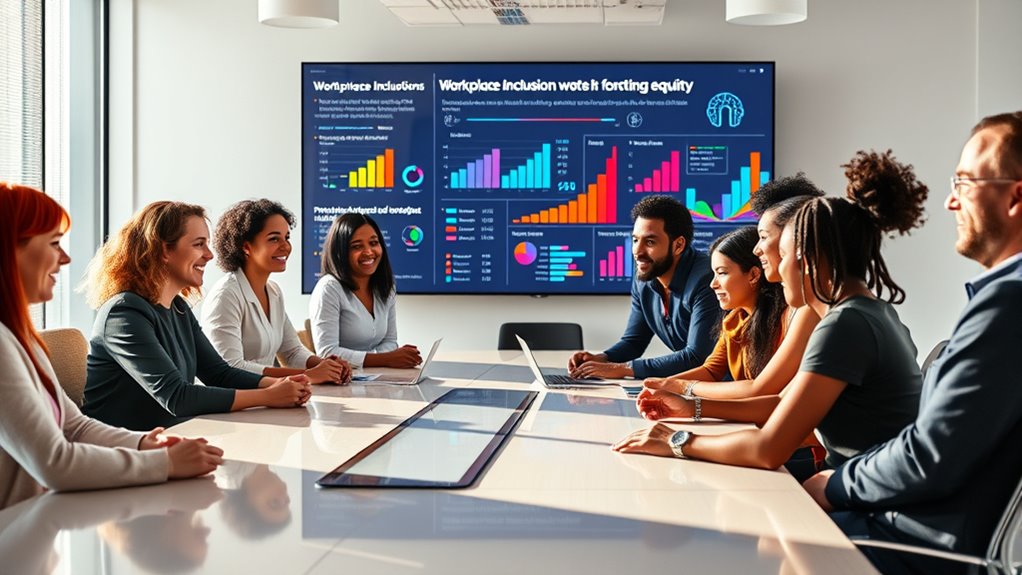AI helps create more inclusive workplaces by identifying and addressing biases in hiring, promotions, and evaluations. It analyzes large amounts of data to spot hidden patterns of underrepresentation and unconscious bias, then offers fairness metrics and mitigation tools like IBM’s AI Fairness 360. By implementing ethical standards and transparent processes, you can build trust and fairness across your organization. To discover practical strategies and innovative solutions, stay with us as we explore how technology is transforming workplace diversity efforts.
Key Takeaways
- AI detects unconscious biases in hiring, promotions, and evaluations, promoting fairer decision-making processes.
- Bias mitigation tools like IBM’s AI Fairness 360 help identify and reduce discrimination in datasets and models.
- Transparent AI systems enable organizations to explain decisions, fostering trust and inclusivity.
- Regular audits and diverse data sources ensure ongoing fairness and reduce underrepresentation.
- AI personalizes employee experiences and development, supporting diversity and equitable growth opportunities.
The Growing Role of AI in Promoting Diversity and Inclusion

AI is increasingly playing a pivotal role in promoting diversity and inclusion in the workplace. It helps identify gaps and biases that are often invisible to human eyes, enabling you to develop fairer hiring and promotion practices. AI-driven tools analyze vast amounts of data to highlight patterns of underrepresentation or unconscious bias, empowering you to address these issues proactively. With AI, you can create personalized experiences for employees, supporting their growth regardless of background. Many organizations are investing in AI solutions that foster inclusivity by reducing discriminatory practices and ensuring equitable opportunities. Additionally, understanding the trustworthiness of AI models is essential to ensure that these tools are reliable and unbiased in their assessments. This technology not only enhances fairness but also boosts employee morale and engagement, making your workplace a more welcoming environment for everyone.
How AI Tools Are Identifying and Mitigating Bias in Recruitment

As organizations endeavor to create fairer hiring processes, AI tools are increasingly being used to identify and reduce bias in recruitment. These tools analyze job descriptions, application materials, and candidate data to detect language or patterns that may favor certain groups. For example, AI can flag biased wording that unintentionally discourages diverse applicants. Algorithms also evaluate candidate profiles objectively, minimizing human biases. Tools like Google’s What-If Tool and IBM’s AI Fairness 360 help organizations test and adjust their models for fairness. By continuously monitoring and refining these systems, you guarantee that your hiring practices promote equity. This proactive approach helps eliminate unconscious bias, making your recruitment process more transparent, inclusive, and aligned with your diversity goals. Incorporating Pimple Patch technology in other areas of health and wellness demonstrates how innovative solutions can address specific needs effectively.
Implementing Ethical Standards for Fair AI Deployment

Implementing ethical standards for fair AI deployment is essential to guarantee that automated systems promote equity and trust within your organization. You should establish clear guidelines that prioritize transparency, accountability, and fairness in AI use. This includes defining ethical principles, such as non-discrimination and privacy protection, and ensuring these guide your AI development and deployment processes. Regular audits and evaluations are necessary to detect and address biases or unintended consequences. You also need to involve diverse stakeholders, including employees and ethicists, in decision-making. Training your team on ethical AI practices helps embed these standards into daily operations. By fostering a culture of responsibility, you build confidence among your workforce and stakeholders, ensuring AI serves everyone fairly and ethically. Incorporating ethical hacking practices into AI systems can help identify vulnerabilities and improve security measures.
Overcoming Challenges: Addressing Biases in AI Training Data

Biases in training data pose a significant challenge for organizations aiming to deploy fair and effective AI systems. These biases can lead to discriminatory outcomes, undermining trust and fairness. To overcome this, you need to take proactive steps.
- Regularly audit datasets for hidden biases before training.
- Use diverse and representative data sources to reflect all groups.
- Incorporate fairness metrics throughout the model development process.
- Leverage bias mitigation tools like IBM’s AI Fairness 360.
- Foster collaboration between data scientists, ethicists, and stakeholders.
- Ensuring the quality of juice extraction processes can help prevent inadvertent bias introduction in data collection and curation.
Addressing biases isn’t a one-time fix; it requires ongoing vigilance and refinement. By prioritizing data quality and transparency, you can build AI systems that promote inclusivity and reduce unintended discrimination.
The Impact of AI Governance on Inclusive Workplace Practices

You play a key role in ensuring AI governance enforces ethical standards that promote fairness and transparency. Implementing bias detection strategies helps identify and mitigate discriminatory outcomes before they impact employees. When organizations prioritize these governance practices, they create more inclusive workplaces where AI benefits everyone. Incorporating somatic therapy techniques into organizational training programs can also foster greater emotional awareness and empathy among staff, further supporting inclusive environments.
Ethical Standards Enforcement
As organizations increasingly rely on AI to foster inclusive workplaces, the enforcement of ethical standards through robust governance becomes essential. You need clear policies, monitoring mechanisms, and accountability structures to guarantee AI systems operate fairly and transparently. Without strong governance, biases may creep in, undermining diversity efforts and risking reputational damage. Additionally, understanding the potential for bias in AI systems is crucial for developing effective mitigation strategies. To maintain ethical standards, consider:
- Regular audits of AI decision-making processes
- Implementing transparent algorithms and explainability features
- Establishing oversight committees for AI ethics
- Enforcing strict data privacy and security measures
- Providing ongoing training on AI ethics for staff
These steps help you build trust, promote fairness, and ensure AI contributes positively to an inclusive work environment. Effective governance aligns AI deployment with your organization’s values and legal requirements.
Bias Detection Strategies
Effective bias detection strategies are essential for ensuring AI systems support inclusive workplaces, especially when governance structures are in place to oversee ethical standards. You need to implement tools like IBM’s AI Fairness 360 and Google’s What-If Tool to identify biases in data and algorithms. Regular audits can reveal discriminatory patterns before they impact decision-making, allowing you to address issues proactively. Transparency in model development and validation processes helps build trust and accountability. Combining automated bias detection with human oversight ensures nuanced understanding of potential biases. Clear documentation of bias mitigation efforts supports compliance with ethical standards. Ultimately, a robust bias detection strategy under governance frameworks ensures AI promotes fairness, reduces discrimination, and fosters an inclusive environment for all employees. Additionally, incorporating emotional support considerations into AI systems can help address the diverse needs of users and create a more empathetic technological environment.
Leveraging AI to Create Personalized Development Opportunities

AI is transforming workplace development by enabling personalized learning and career growth plans tailored to each employee’s unique skills, goals, and preferences. With AI, you can access tailored training modules, identify skill gaps, and receive recommendations for growth opportunities aligned with your career aspirations. This customization helps you stay engaged and motivated, increasing your chances of success. AI-driven platforms analyze your performance data to suggest relevant courses, mentorship programs, and projects that match your development needs. Additionally, integrating automation into development processes can streamline training delivery and resource allocation.
Case Studies: Successful Use of AI to Reduce Workplace Bias

Many organizations have successfully harnessed AI to combat workplace bias, demonstrating how technology can promote fairness and inclusion. For example, a global tech firm implemented AI-driven tools to analyze hiring patterns and identify bias in their recruitment process. They used AI fairness tools like IBM’s AI Fairness 360 to detect and mitigate unconscious biases, resulting in a more diverse candidate pool. Similarly, a financial services company adopted AI algorithms to standardize performance evaluations, reducing subjectivity and favoritism. These systems provided transparent insights into employee assessments, promoting equitable treatment. Additionally, integrating inclusive design principles into AI development ensures that these tools are accessible and fair to all users. As a result, both organizations saw increased diversity and improved employee satisfaction. These case studies highlight how responsible AI deployment can actively reduce bias, foster inclusive cultures, and set new standards for fairness in the workplace.
The Future of Fairness: Innovations in AI for Inclusion

Innovations in AI are shaping the future of fairness and inclusion in the workplace, building on recent successes in reducing bias. You’ll see smarter algorithms that adapt and improve, creating fairer hiring, promotion, and evaluation processes. Cutting-edge tools now analyze decision patterns for hidden biases and automatically adjust to promote equity. Personalization becomes more precise, offering tailored development plans that support diverse needs. Transparency features will help you understand AI decisions better, fostering trust. Additionally, ongoing research will develop models that actively counteract biases before they influence outcomes. As these innovations mature, workplaces will become more inclusive, ensuring everyone has equal opportunities to thrive. You’ll benefit from AI systems that prioritize fairness, making your organization a leader in ethical and equitable work environments.
AI innovations are enhancing fairness and inclusion through smarter, transparent, and bias-aware decision-making tools.
Furthermore, advancements in bias mitigation techniques ensure that AI-driven decisions are increasingly fair and unbiased across various scenarios.
Strategies for Integrating AI Ethically in HR Processes

Integrating AI ethically into HR processes requires a proactive approach that prioritizes fairness, transparency, and accountability. You should establish clear ethical guidelines and regularly audit AI systems using tools like IBM’s AI Fairness 360. Training HR teams on bias detection and ethical AI practices ensures responsible deployment. Implement governance frameworks that include diverse stakeholders to oversee AI integration, evaluate algorithms for bias, and update policies as needed. Use transparent decision-making processes, providing employees with explanations for AI-driven choices. Regularly monitor AI outcomes to identify biases and rectify issues promptly.
| Strategy | Key Action | Outcome |
|---|---|---|
| Ethical Guidelines | Define standards for AI fairness | Consistent, fair AI use |
| Bias Audits | Conduct regular bias assessments | Reduced discriminatory outcomes |
| Stakeholder Inclusion | Engage diverse teams in AI oversight | Increased transparency and trust |
| Employee Communication | Explain AI decision processes to staff | Improved understanding and buy-in |
| Continuous Monitoring | Track AI impact and rectify biases | Sustained ethical AI practices |
Frequently Asked Questions
How Do AI Systems Ensure Transparency in Bias Reduction Processes?
You can guarantee transparency in bias reduction by leveraging AI tools like Google’s What-If Tool and IBM’s AI Fairness 360, which provide clear insights into how algorithms make decisions. These tools allow you to analyze data and model outcomes, making biases visible and understandable. Implementing robust governance and documenting your processes also help maintain transparency, so you can identify and address biases effectively while building trust in your AI systems.
What Training Is Needed for HR Teams to Manage AI Fairness Tools?
You need to train HR teams on AI fairness tools to guarantee effective bias mitigation. Since 92% of companies plan to increase AI investments, understanding these tools is vital. Focus on educating HR staff about how to interpret bias reports, implement ethical guidelines, and use tools like IBM’s AI Fairness 360. This training empowers HR to manage AI responsibly, promote fairness, and foster inclusive workplaces amid rapid technological growth.
Can AI Inadvertently Reinforce Existing Workplace Biases?
Yes, AI can inadvertently reinforce existing biases if the training data reflects those biases. You need to guarantee your AI systems are regularly audited with bias mitigation tools like Google’s What-If Tool or IBM’s AI Fairness 360. Implement robust governance and transparency measures, and continuously review your algorithms. By actively addressing bias during development and deployment, you help prevent AI from perpetuating discrimination and promote fairer workplace practices.
How Is Employee Feedback Integrated Into AI Bias Mitigation Strategies?
You should guarantee employee feedback actively shapes AI bias mitigation strategies. Encourage open channels for workers to report biased AI outcomes and incorporate their insights into system improvements. Regularly review feedback to identify patterns and adjust algorithms accordingly. By involving employees in ongoing assessments, you promote transparency, build trust, and refine AI tools to better reflect fairness, ultimately creating a more inclusive and unbiased workplace environment.
What Legal Considerations Govern AI Use in Diversity Initiatives?
Think of AI as a double-edged sword in diversity initiatives. Legally, you must guarantee AI complies with anti-discrimination laws like Title VII and the Equal Employment Opportunity Act, preventing bias and unfair treatment. Data privacy laws, such as GDPR and CCPA, also govern how employee data is used. Regular audits and transparent algorithms are essential to avoid legal pitfalls, making certain your AI promotes fairness while respecting legal boundaries.
Conclusion
Imagine AI as a gardener tending to a diverse orchard, pruning biases and nurturing fairness. By harnessing ethical AI tools, you can cultivate an inclusive workplace where every individual thrives. Studies show that companies using AI for diversity see up to 30% improvement in employee satisfaction. Embrace this technology thoughtfully, like tending a delicate garden, and watch your organization flourish with fairness, innovation, and genuine inclusion.









